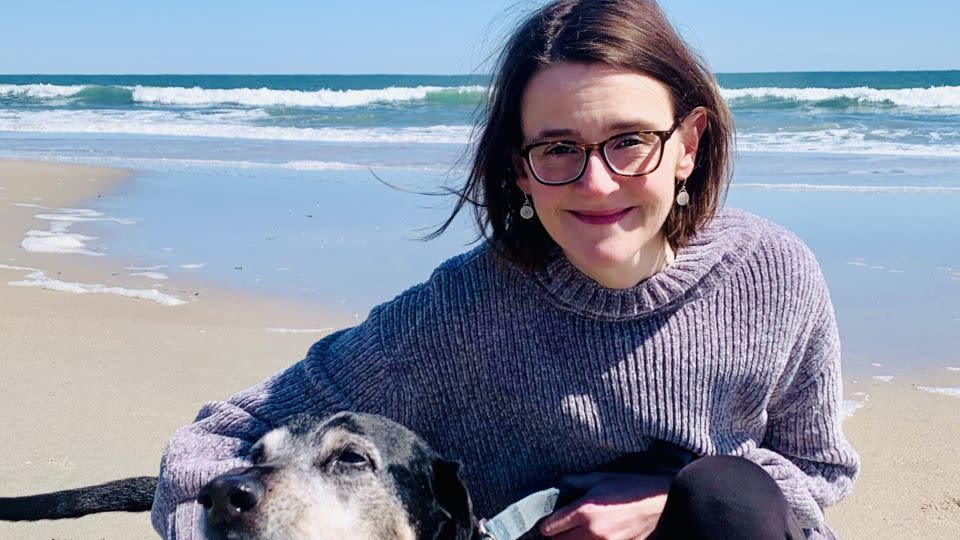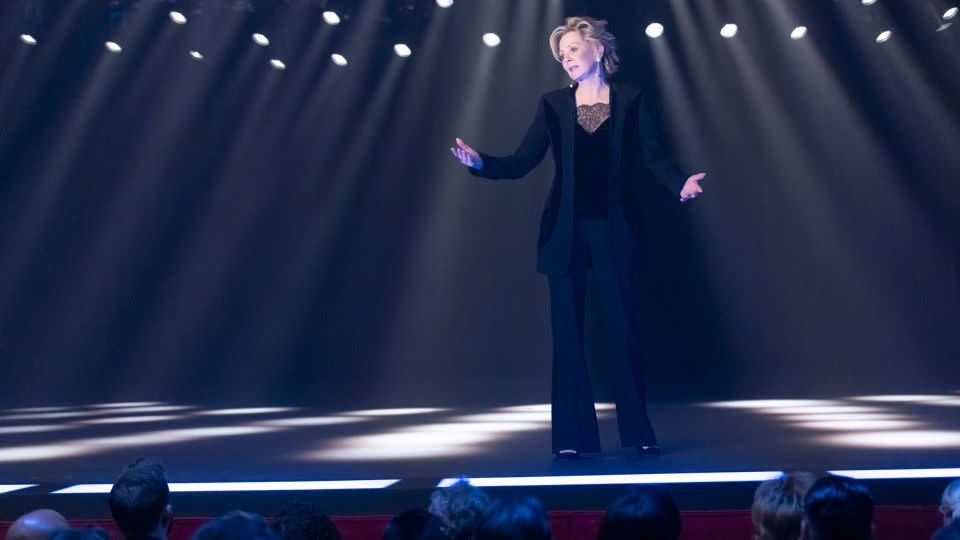Opinion: The glorious ‘Hacks’ threw its audience a bleak curveball. What now?
Editor’s Note: Sara Stewart is a film and culture writer who lives in western Pennsylvania. The views expressed here are her own. View more opinion on CNN.
This essay contains spoilers for Season Three of “Hacks.”

Who saw that “Hacks” finale twist coming? Possibly only someone who had just finished a rewatch of “All About Eve.”
Personally, I was naively hoping for a shared Deborah/Ava win as Jean Smart’s 70-year-old character finally grabbed her brass ring — the host spot on a major late-night show desk. But uncomplicated victory, of course, is not the stuff of which multiple TV seasons are made.
The conclusion to the glorious third season of HBO’s comedy “Hacks” saw Ava (Hannah Einbinder) putting into practice all the lessons she’s learned from her boss, comedy veteran Deborah (Smart), and regaining her head writer job via blackmail. The clear takeaway: You have to be willing to be absolutely ruthless to be a player in the patriarchy that still dominates mainstream comedy.
No disrespect, but… duh.
I’m conflicted, because I have savored nearly every moment of this show, from its exploration of the absurdism of aging as an entertainer in the public eye to the May-December platonic love between two prickly and hilarious women to, more broadly, the ever-evolving state of comedy. The show is a valentine to that industry at a time when it’s ever-harder for funny people to find outlets. (“Hacks” airs on HBO and streams on Max, both of which share a parent company, Warner Bros. Discovery, with CNN.)
“To even be making a comedy today, we feel really lucky,” co-creator Jen Statsky told the Hollywood Reporter. “For some reason, there seem to be fewer and fewer of them. Even anecdotally, a friend told me the other day that some young writers he knew — writers who are on staff at comedies — had their agents tell them, ‘You should really write a drama.’ Comedy is not being upheld as the necessary, important thing that it is.” Except on “Hacks!”
Threaded into the funny have been genuine dramatic developments too, though: Deborah and her sister Kathy (the always great J. Smith-Cameron) beginning a shaky reconciliation; Deborah discovering her male comedy heroes are cruel and calcified; Deborah being (mildly, briefly) held to account for offensive early material. If you ask me, Ava’s “student has become the master” moment is maybe the least innovative turn in a season that had plenty of them.
Of course, it makes a certain amount of sense for “Hacks” writers to bring us all back down to earth after this fantastical twist in which a septuagenarian woman is crowned the new Queen of Late Night. None of it comes without a price. It’s right to remind us just how much of the old-boy system is baked into Deborah’s DNA, no matter how much progress Ava might have made in getting her boss to admit she’s more than just a formidable insult machine — and Ava, in turn, learning some lessons in humanity herself.

The most obvious real-life model for Deborah Vance is Joan Rivers, though “Hacks” creators have mostly sidestepped saying so. Rivers rose to fame saying things nobody else was saying — particularly women — then had a brief run as a late-night host before losing the gig. She was, like Deborah, a comic chiefly known for her talent for evisceration of anyone and everyone, including herself. And I like that “Hacks” imagines a future in which a Rivers-like comic learns from a younger, queer woman to jettison at least some of her reliance on punching down. (As one Huffington Post writer put it shortly after her death, Rivers’ “comedy shtick was rooted in deeply misogynistic ideas about women.”)
Yet I find myself wondering if the finale about which so many people are raving is really breaking as much new ground as, say, literally any other episode thus far. Do any of us really need to be told that Hollywood (as with every other major industry) is an unethical playground of entitled, mostly-White men? That the safe move is to toe the patriarchy line? It’s the kind of cliche that calls to the mind the timeless “Devil Wears Prada” meme: “Florals? For spring? Groundbreaking.”
Just ask Samantha Bee, whose late-night show “Full Frontal” survived longer than most female-led news and talk shows, running for seven seasons before it was cancelled in 2022, the night before the Supreme Court’s Roe-ending Dobbs decision, no less (TBS, the network that aired Bee’s show, also shares its parent company with CNN). Other late-night shows hosted by Amber Ruffin, Chelsea Handler, Michelle Wolf, Robin Thede and Busy Philipps all had shorter tenures before being axed.
Taylor Tomlinson, the newest addition to the female late-night lineup, is running a different sort of show — more riffing from comics, less traditional interviews — and has said she’s not a huge fan of the pressure of being reminded that she’s currently the only woman in late night. “I would love to see a traditional talk show helmed by a woman. I would love to see more shows like ours,” she’s said. “There are lots of different ways to do this, a lot of different perspectives, and they aren’t being represented currently.”
It’s certainly telling that the only traditional talk show helmed by a woman, at the moment, is in the fictional landscape of “Hacks.” And that Deborah’s hard-fought victory involved stabbing her best friend in the back before being stabbed herself. Fantasyland, it is not. But it definitely left us with a lot of food for thought, with a fourth season already, thankfully, in the works.
There’s another recent show that did some great excavation of similar themes: the intersection of different generations in the world of televised comedy and the way in which aging performers are compelled to reconcile their old material with getting along in a different, more sensitive age. That show was Hulu’s “Reboot,” cancelled after only one season. It didn’t get the kind of critical raves “Hacks” did, but to be fair, it also was never given a chance to really spread its wings. (Creator Steven Levitan is reportedly shopping it to other networks, so maybe it will rise again.)
I’m confident the grand plan for “Hacks” (Downs et al. have said there’s a planned fifth season) is to upend the note on which this season closed — to show how it is, indeed, possible to make change from the inside and do groundbreaking comedy on a mainstream scale in a way that’s different from the way it’s always been done. But I still don’t find myself totally wowed by the bleak curveball that closed out this season.
For more CNN news and newsletters create an account at CNN.com

 Yahoo News
Yahoo News 
